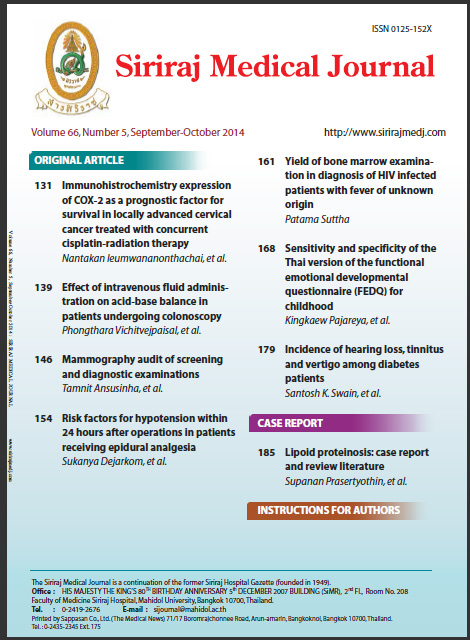Sensitivity and Specificity of the Thai Version of the Functional Emotional Developmental Questionnaire (FEDQ) for Childhood
Abstract
Objective: This study aimed to examine the sensitivity and specificity of the Thai version of the Functional Emotional Developmental Questionnaire (FEDQ) as a screening tool for children with delayed development.
Methods: The FEDQ was translated with standard method. The final version of the FEDQ was administered by caregivers of the children. The experts’ opinions of the children’s development were used as the gold standard. All of the children who were categorized as “Functional Delay” and fifty-five children categorized as “Functional Normal” were randomly selected and sent to the assessor to perform Denver II Development Screening test (DDST).
Results: Ninety respondents (86%) of 113 respondents were mothers. The mean age of the children was 22.7 months (range 4-42). The Thai version of the FEDQ had a satisfactory internal consistency (Cronbach's alpha = 0.83) Test-retest reliability was acceptable with the intra-class correlation coefficient of 0.89 (95% CI 0.82 to 0.93). When the cut point of 0.5 level less than age-appropriated functional developmental was used, the Thai version of the FEDQ had a sensitivity of 0.82, a specificity of 0.54, positive predictive value (PPV) of 0.32, negative predictive value (NPV) of 0.92, and an accuracy of 0.80. The diagnostic agreement of the Thai version of the FEDQ and Denver II Development Screening Test (DDST) was fair (Kappa = 0.31).
Conclusion: The Thai version of the FEDQ was found to be a reliable and valid caregiver-assessment to screen for children with delayed development at a cut-off point of 0.5 level less than age-appropriated functional developmental level. More studies with a larger sample size with the parent of the children less than 12 months of age should be performed.
Keywords: The Functional Emotional Developmental Questionnaire, screening test, child development
Downloads
Published
How to Cite
Issue
Section
License
Authors who publish with this journal agree to the following conditions:
Copyright Transfer
In submitting a manuscript, the authors acknowledge that the work will become the copyrighted property of Siriraj Medical Journal upon publication.
License
Articles are licensed under a Creative Commons Attribution-NonCommercial-NoDerivatives 4.0 International License (CC BY-NC-ND 4.0). This license allows for the sharing of the work for non-commercial purposes with proper attribution to the authors and the journal. However, it does not permit modifications or the creation of derivative works.
Sharing and Access
Authors are encouraged to share their article on their personal or institutional websites and through other non-commercial platforms. Doing so can increase readership and citations.










